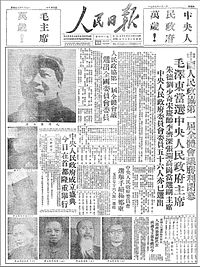- People's Daily
-
Not to be confused with Peoples Daily.
People's Daily
人民日报

Front page on 1 October 1949
(the day the PRC was established)Type Daily newspaper Owner Communist Party of China Publisher Central Committee of the Communist Party of China Founded 15 June 1948 Language Chinese Headquarters Chaoyang District, Beijing Official website english.peopledaily.com.cn (English)
www.people.com.cn (Simplified Chinese)The People's Daily (Chinese: 人民日报; pinyin: Rénmín Rìbào) is a daily newspaper in the People's Republic of China. The paper is an organ of the Central Committee of the Communist Party of China (CPC), published worldwide with a circulation of 3 to 4 million. In addition to its main Chinese-language edition, it has editions in English, Japanese, French, Spanish, Russian, and Arabic. Similar to Pravda's relationship with the Soviet Union, the newspaper provides direct information on the policies and viewpoints of the Party. It maintains an online presence as The People's Daily Online (人民网).
Contents
History
The paper was established on June 15, 1948 and was published in Pingshan, Hebei, until its offices were moved to Beijing in March 1949. Ever since its founding, the People's Daily has been under direct control of the Party's top leadership. Deng Tuo and Wu Lengxi served as editor-in-chief from 1948–1958 and 1958–1966, respectively, but the paper was in fact controlled by Mao's personal secretary Hu Qiaomu.
During the Cultural Revolution, the People's Daily was one of the few sources of information from which either foreigners or Chinese could figure out what the Chinese government was doing. During this period, an editorial in the People's Daily would be considered an authoritative statement of government policy and was studied across the nation.
Newspaper articles in the People's Daily are often not read for content so much as placement. A large number of articles devoted to a political figure or idea is often taken as a sign that the mentioned official is rising.
Editorials in the People's Daily are also regarded both by foreign observers and Chinese readers as authoritative statements of government policy. Distinction is made between editorials, commentaries, and opinions. Although all must be government approved, they differ sharply on the amount of official authoritativeness they contain. For example, although an opinion piece is unlikely to contain views that are opposed to those of the government, it may express a viewpoint, or it may contain a debate that is still under consideration and may reflect only the opinions of the writer. By contrast, an official editorial, which is rather infrequent, means that the government has reached a final decision on an issue.
During the Tiananmen Square Protests of 1989, the People's Daily editorial of April 26, which condemned "unlawful parades and demonstrations," marked a significant moment in the newspaper's history.[1] The editorial increased tension between the government and protesters, and top CPC leaders argued about whether to revise it.
Since the mid-1990s, the People's Daily has faced a decline of governmental subsidies combined with increasing competition from international news sources and Chinese tabloids. As part of its effort to modernize, it began an online edition in 1997, and the web bulletin forums, such as the Strengthening Nation Forum in the Chinese edition, has been known for their surprisingly candid content. The complexity of the People's Daily's situation can be seen by the fact that it is a dot-com, with banner advertising for washing machines and Coca-Cola next to banners promoting the Communist Party of China.
The People's Daily is also responsible for the publication of the strongly nationalistic Global Times,[2] and hosts the Strengthening Nation Forum on its website.[3]
The internet new portal of People's Daily includes pages in Arabic, French, Russian, Spanish, Japanese and English. In comparison to the original Chinese version, the foreign language version offer less in-depth discussion of domestic policies and affairs and more editorial about China's foreign policies and motives, often explaining China's positive intentions[4]. In addition, the portals runs an English page dedicated to Tibet, which can be understood as means to show China's positive attitude towards the province, which has become a major point of controversy worldwide.
Former and present chief officers
- Zhang Panshi (张磐石)
- Hu Qiaomu (胡乔木)
- Fan Changjiang (范长江)
- Deng Tuo (邓拓)
- Hu Jiwei (胡绩伟)
- Qin Chuan (秦川)
- Qian Liren (钱李仁)
- Gao Di (高狄)
- Shao Huaze (邵华泽)
- Bai Keming (白克明)
- Xu Zhongtian (许中田)
- Wang Chen (王晨)
- Zhang Yannong (张研农) (incumbent)
See also
- Media of the People's Republic of China
- Xinhua News Agency
- China News Service
- Reference News
- Global Times
- Strengthening Nation Forum
References
Further reading
- Wu Guoguang. "Command Communication: The Politics of Editorial Formulation in the People's Daily". China Quarterly 137:194–211.
- People's Daily. "人民日报基本情况" ("Basic facts about the People's Daily"), 2003-05-14.
External links
Categories:- Chinese-language newspapers (Simplified Chinese)
- Newspapers published in the People's Republic of China
- Communism in China
- Communist newspapers
- Publications established in 1948
- Multilingual news services
Wikimedia Foundation. 2010.
